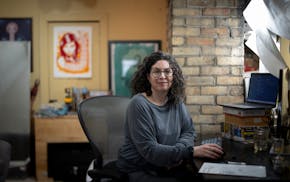on the other hand brad allen |
Don Hall likes to keep his money close to home.
The 77-year-old retired stockbroker says he has made a both a living and a career out of studying and investing in Minnesota companies. "It's my hobby and my life's work."
It's also an obsession that began more than 50 years ago when the head of a local brokerage firm suggested Hall research the then-hot local tech and IPO market for his graduate school thesis. His mentor suggested that Control Data, then a Wall Street legend and the center of Minnesota's computer industry, had started it all.
Instead of finishing his thesis, Hall immersed himself in that world, working for 13 years at Control Data as a financial manager, getting to know many of the founders including Bill Norris and Seymour Cray, who would eventually start his own supercomputer company. In 1980 Hall launched a 20-year career as a stockbroker. When he retired in 2000, he returned to the original idea behind his grad school thesis, bringing his intimate knowledge of the local business and tech communities to writing the book "Generation of Wealth."
In it, Hall recounts how Control Data founders sold their IPO door-to-door to neighbors and at house parties, where an initial dollar a share investment rocketed to over $100 a share in four years. That success, followed by Medtronic, inspired a generation of individual investors, brokers and bankers, turning the Twin Cities into a hotbed of start-ups, IPOs and "crazy" valuations his long-ago adviser had observed.
While his book recounts the successes and failures of that era, Hall wonders if investors today still have both the mind-set and the opportunity to build a successful investment portfolio out of individual local company stocks.
Hall acknowledges that things are different today. High-profile crackdowns on insider trading have muted some of what Hall described as "a circle of gossip" where local investors would trade ideas and information about the next potential Control Data. In a world of online trading, global markets, instant access to information and powerful analytical tools available to anyone with a PC, perhaps the idea of an insulated "local" market is obsolete.
"The financial media tells people they can't beat the market," Hall observed. Investors are encouraged to avoid stock picking and instead rely on asset allocation strategies, no-load mutual funds, index funds and life-cycle funds to build their nest eggs. As discount brokers and stocks trading in penny increments have cut into brokerage commissions, the industry has morphed from individual brokers helping clients pick stocks to fee-based advisory services and wrap accounts. And he knows that the average individual investor often doesn't have the time to research and track local companies.
Even so, Hall still finds plenty of local companies to invest in. He is excited about Stratasys and Proto Labs located here, both innovative companies leading the burgeoning direct digital manufacturing industry based on 3-D printing.
Hall's research approach is straightforward and based on common sense as much as it is gossip. "Look for a key indicator … that good things are happening," such as aggressive hiring or building a new plant. Those tidbits are easier for investors on the ground locally to spot.
One of the easiest ways to research a local company that is typically ignored by many investors is to attend a company's annual meeting. Often, he'll be the only non-employee in attendance, particularly for smaller companies, where he gets the chance to meet senior management and ask questions about the business.
Following a successful executive can lead to good investment ideas, he added, recalling how he had observed that local entrepreneur Doug Pihl was "a results-oriented engineer." Hall put clients' money into several of Pihl's companies, including NetStar, which was later bought out for a substantial gain. Not all of Pihl's companies worked out, Hall admitted, but the NetStar saga resulted in one of Hall's most personally satisfying experiences as a broker.
He recalled a client who had $12,000 in an IRA "that wasn't doing much" in mutual funds. The client asked him about putting it all into NetStar. Since it was not his client's only savings and Hall admired Pihl's accomplishments, they went ahead with the investment, which increased twentyfold when the company was bought out a few years later. The client then put the gains into solid big cap stocks and today, 20 years later, $12,000 has turned into retirement savings of more than $900,000.
It "changed his financial profile" and made a meaningful difference in his retirement, Hall said proudly, all from investing locally.
Brad Allen is a freelance journalist.
Stock market today: Wall Street slides in premarket as airlines, Big Tech report earnings
Southwest will limit hiring and drop 4 airports after loss. American Airlines posts 1Q loss as well
Venice tests a 5-euro entry fee for day-trippers as the city grapples with overtourism

